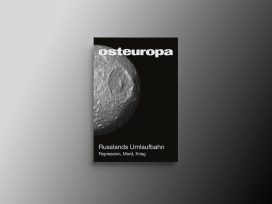Abstracts Osteuropa 10/2006
Kai-Olaf Lang
Anatomy of a reticence. Germany and the Visegrád group
Although Germany supported the accession of Poland, the Czech Republic, Hungary, and Slovakia to Nato and the EU, there is to this day no specific German Visegrád policy. The reason for this is that EU enlargement had priority over a genuine Mitteleuropapolitik. Such a policy would meet with historically founded distrust in the East and the West. Bilateral relations have priority. The weak relations with the Visegrád group result not least from the structural historical and political differences between Poland and the “smaller countries”, which prevent the Visegrád group from forming an attractive forum of cooperation. However, in order to improve their ability to act within the EU, it would be advisable to give Visegrád more substance and strengthen cooperation with the group.
Jiri Vykoukal
Meltdown or fission? Concepts of central Europe and regional integration
Central Europe sounds full of promise. The term suggests cultural diversity and political unity. In fact, it is just the opposite. The political concepts of central Europe that have been developed since the nineteenth century were supposed to serve all national ends. This was never realised even in times of crisis. By contrast, the idea that central Europe formed a single culture separate from that of eastern Europe developed into a dangerously explosive force for the Soviet system in the 1980s. Since the collapse of the Soviet Union, however, the Visegrád group has suffered from a lack of cohesion, for regional cooperation cannot be convincingly placed in the trajectory of tradition in any of the four states, leaving regional cooperation lacking historical legitimacy.
Jan Ruzicka, Michal Koran
Those pronounced dead live longer. The Visegrád group after EU accession
The Visegrád project is still alive. It has often been written off in the past 15 years, and after the EU accession of the four states, it was declared dead. Cooperation may hardly be institutionalised, but ministries and agencies are trying to cooperate in many policy fields. Within the EU, the four states are working with one another to integrate the Balkan states and Ukraine. Since 2000, the group has had its own small budget in the form of the International Visegrád Fund.
Jacques Rupnik, Anne Bazin
Progress and regress. Poland, the Czech Republic, and Germany since 1989
With the accession of Poland and the Czech Republic to the European Union in 2004, the road seemed clear for a final reconciliation with the Germans and for fruitful cooperation in Europe. However, reform fatigue and the participation of populist, nationalist, and euro-sceptic groups in central eastern Europe have, after a phase of rapprochement, led to stagnation or, in the case of Poland, a chill. Historical disputes, differences concerning relations with the United States and Russia and concerning Europe’s future are putting a strain on bilateral relations and putting further European integration at risk.
Vladimir Handl
Relaxed exercises. The Czech Republic and Germany in the EU
For the first time in contemporary history, one can speak of Czechs and Germans cooperating with one another instead of going head-to-head or merely existing side-by-side. The asymmetry of power between the two states and the memory of the Second World War may still influence Czech political thought, but mutual integration in Nato and the EU has clearly reduced the significance of such factors. There may still be fundamental differences of opinion on basic issues of European policy that the Czech political world sees as central to their making a mark in terms of programmes. In fields of policy, however, both sides are showing a pragmatism unperturbed by the political storms surrounding political treatment of the past and basic issues of European policy.
Vladimir Bilcik, Juraj Buzalka
The non-existent community. Slovakia and Germany
German-Slovak relations are not burdened by historical conflicts. However, they suffer from the asymmetry between the two states. Slovakia is nowhere near as important to Germany as Germany is to Slovakia. On the basis of its economic strength and political influence as well as its membership in the Schengen area of free movement and the euro-zone, Germany is an important EU partner and protégé for Slovakia. By contrast, divergences in interests predominate when it comes to opening up the EU-internal market to workers from central eastern Europe and bringing EU tax rates into line with one another. The internal EU-split into fully entitled and not yet fully entitled members as well as fundamental questions of European policy, such as the constitutional treaty, are also igniting internal Slovak conflicts.
Josefine Wallat
Old burdens, new opportunities. Germany and the Visegrád States
Germany and the four central eastern European states have built up strong relations since the end of the East-West conflict. However, these relations are not free of tensions. As in the past, the burden of history’s legacy still makes itself felt. Differing concepts of the tasks and goals of the EU and the transatlantic relationship repeatedly lead to irritation. Often the Visegrád states fail to take up a common position and instead gamble on acting as individual states. German policy also tends to be bilateral rather than oriented towards the group as a whole.
Thomas von Ahn
Democracy or the street? On the stability of the Hungarian political system
In mid-September 2006, Hungary was shaken by a partly violent wave of demonstrations. The cause was a speech by Hungarian Prime Minister Ferenc Gyurcsány in which he admitted that, before the election, he knowingly played down the national debt. The protests against Gyurcsány and the austerity policy he introduced in summer 2006 mark the preliminary culmination of a conflict between political camps which has been growing in intensity for years. The right-wing conservative camp, which has been in the opposition since 2002, increasingly seems to be calling the political system into question. The rift between the camps is exacerbated by disputes over the past which conceal fundamental differences in national politics.
Michael W. Bauer, Jutta Kuppinger
Regional autonomy and regional development. EU programmes in Poland and the Czech Republic in comparison
The creed of European regional policy so far has been that regional development programs are best implemented in decentralized state structures. A comparison of the implementation of community initiative Intereg III A in Poland and the Czech Republic leads to the opposite conclusion: The more centralized a state in structure, the more successful the implementation of European regional assistance in central eastern Europe. While disputes over responsibility between regional administrative units and the national level prevent prompt and effective regional development, the Czech Republic’s clear, centralized state structure contributes to the successful deployment of EU funds.
Walter Kaufmann
Shooting itself in the foot. Georgia and Russia in a spiral of escalation
The conflict between Russia and Georgia has escalated to crisis. The public expulsion of Russian agents from Georgia provided the pretext. Russia reacted with sanctions and deportations. At the heart of the matter lie competing interests. Georgia is fighting for its territorial integrity. Russia is supporting the renegade regions of Abkhazia and South Ossetia. Georgia is drawn to Nato, which meets with displeasure in Russia. The actions of the parties to the conflict are counterproductive. Moscow’s manipulations and deportations strengthen the government of Georgian President Mikhail Saakashvili. And his aggressive rhetoric and risky policy makes the re-establishment of Georgia’s territorial integrity more unlikely. With a policy of escalation, both regimes are taking a bearish turn.
Published 20 November 2006
Original in German
Contributed by Osteuropa © Osteuropa
PDF/PRINTNewsletter
Subscribe to know what’s worth thinking about.



